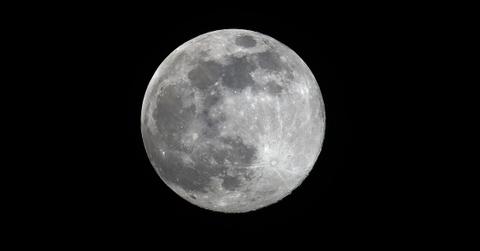A Piece of Space Junk Crashed Into the Moon, Forming a New Crater
Published April 7 2022, 3:38 p.m. ET

The supermoon rises over West London on April 7, 2020.
Space junk, or the estimated 6,000 tons of discarded space technology that is currently floating around outer space, is a growing problem. And recently, a dead rocket booster crashed into the moon, proving just how seriously we need to start taking space junk.
So, what exactly happened to the moon on March 4, 2022? Here’s what we know.

What happened to the moon on March 4, 2022?
At about 7:25 a.m. ET on March 4, 2022, a dead rocket booster that had been floating around outer space for years crashed into the moon, as reported by National Geographic.
The rocket booster hit the moon’s Hertzsprung crater with a powerful force, at an estimated speed of 5,800 miles per hour, as per The Sun. The crash happened on the side of the moon that cannot be seen by telescopes, according to CNET, so humans have yet been able to see the aftermath of the crash firsthand. However, experts believe the collision likely created a new crater on the moon (within the Hertzsprung crater), measuring about 65 feet in width, The Sun added.
That said, we may not know the true extent of the damage to the moon for a while.
“NASA’s Lunar Reconnaissance Orbiter will use its cameras to attempt to identify the impact site and determine any potential changes to the lunar environment resulting from this object’s impact,” a spokesperson for NASA told The Wall Street Journal. “The search for the impact crater will be challenging and might take weeks to months.”
Despite the new crater, the moon seems OK — but the rocket is not. Experts suspect that it was destroyed on impact. But who did the rocket belong to?
Did SpaceX's rocket booster crash into the moon?
So whose responsibility is all this? In February, when astronomers first started tracking the trajectory of the moon-bound rogue rocket, they predicted that it was a SpaceX Falcon 9. Fortunately for Elon Musk, his company was quickly off the hook, as a group of students from the University of Arizona (and their professor) were able to identify the rocket as a Chinese Long March launcher.
As reported by Space.com, the Arizona group concluded that the rocket came from the Chang'e 5-T1 mission, which launched into space in October 2014. That said, China’s space agency is not much more responsible for this incident than any other space agency that has ever ejected space junk into the atmosphere (aka all of them, probably).
Space junk is a growing problem.
As mentioned above, there are an estimated 6,000 tons of old or broken spaceships, rockets, satellites, batteries, and other space tech currently floating around in low Earth orbit (LEO), known as space junk or space debris. Rocket boosters are designed to break away from spaceships after takeoff, and either land in the ocean, or, if they break away once the rocket is already in orbit, they become space junk. Not to mention, it’s pretty much the norm for space expeditions to leave technology behind, destined to float around in LEO for years.
Though this is the first time a piece of space junk has hit the moon, it is not the first time a piece of space junk went astray. Space junk has fallen from LEO onto planet Earth a few times, even injuring humans. And while the UN does ask space agencies to essentially clean up after themselves (aka collect their space junk within 25 years of its mission, as per London’s Natural History Museum), there is no official law governing this astronomic litter.
Green Matters’ new book, Green Living, is the perfect guide to living an eco-friendly lifestyle for people at every stage of the process. You can order Green Living here.